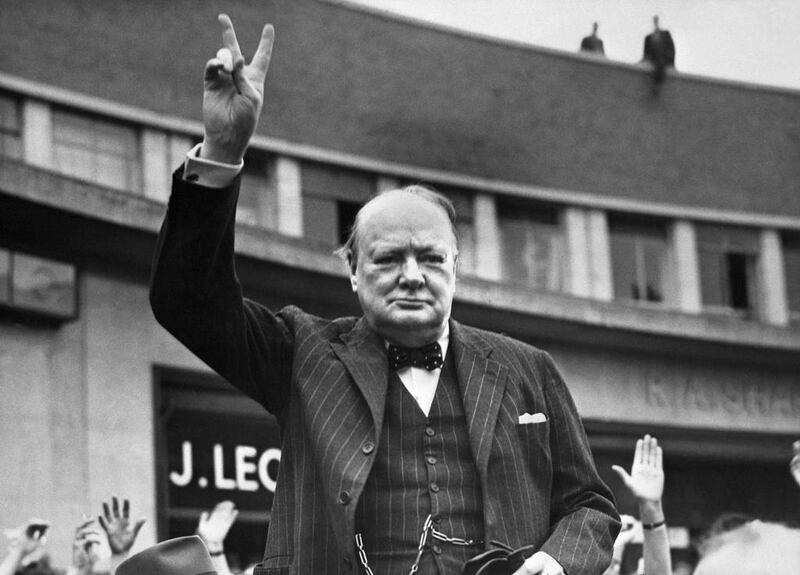The first television programme I ever saw was a live broadcast by the BBC of the state funeral of Winston Churchill, who died 50 years ago this Saturday, at the age of 90.
In a country still struggling with its post-war relegation to the ranks of the second-rate, the death of the wartime leader who had inspired and embodied Britain’s finest hour echoed through the national consciousness like a slamming door.
In the words of Anthony Eden, who served as foreign secretary in Churchill’s wartime cabinet, he had been “the talisman of free men everywhere”.
Not quite everywhere. Fifty years ago, few tears would have been shed for Churchill among the Arabs of Palestine..
In March 1921, Churchill, then colonial secretary, arrived in Cairo for a conference to reconcile the conflicts in Britain’s Middle East policies during the First World War.
One of these was the status of Palestine, which during the war had been promised to the Arabs in exchange for rising against their Ottoman masters, but which was now earmarked for the Jews.
For the Arabs, the conference represented a last chance to persuade Britain to honour the promise it had made, reject the notion of a Jewish homeland in Palestine and halt Jewish immigration. The memorandum delivered to Churchill by the Haifa Congress on March 28, 1921, was a touching and prophetic document, poetic in tone yet raw in its accusation that Britain was betraying the Arabs.
The Arabs’ support for England had “brought down on them the wrath of the Turk, who … used this as an excuse for venging himself on the Arabs, who were tortured, persecuted, exiled and killed”.
What nobody outside the British government knew at the time – but Churchill most certainly did – was that Britain’s support for a Jewish homeland, first promised in the Balfour Declaration of 1917, was as cynical as it was pragmatic.
As the historian James Gelvin noted in his 2005 book, The Israel-Palestine Conflict, the declaration was calculated to persuade wealthy and influential Zionists in the US to back Britain in the war. Promises, in other words, had been made to both Arabs and Jews. Only one would be honoured.
Zionism was certainly helped by the fact that its chief advocate in England was Chaim Weizmann, a Russian-born biochemist who ran the Admiralty laboratories from 1916 and developed a method for producing acetone, in short supply and vital for the production of the explosives Britain needed to wage war. Weizmann, who in 1949 would become Israel’s first president, met and befriended Arthur Balfour before he became foreign secretary in 1916, and convinced him that Zionism was “a great cause”.
Churchill’s response to the Arabs in Cairo was bullying, patronising and deeply insulting, and contrasted starkly with his reaction to a simultaneous representation from the Jewish community. The latter he addressed as noble equals, the Arabs as inferiors who should consider themselves lucky that the Jews wanted to take their land.
Churchill persisted with the fiction that Britain made no commitment over Palestine to the Arabs. It was a lie that would persist for decades, until the minutes of a British cabinet meeting of 1918 emerged, stating that “Palestine was included in the areas as to which Great Britain pledged itself that they should be Arab and independent”.
Despite this, Churchill told the Arabs in 1921 that it was “manifestly right that the Jews, who are scattered all over the world, should have a national home”. Where better than Palestine, with which they had been “profoundly associated” for more than 3,000 years?
He urged them not to worry because Jewish immigration would be “good for the Arabs” who would not be “supplanted … or denied their share”. Britain, he promised, would not tolerate “the violent trampling down of one set of national ideals for the sake of erecting another”.
Then came the insults.
“I thought, when listening to your statements, that it seemed that the Arabs of Palestine had overthrown the Turkish government,” Churchill said, mocking the Arabs’ war contribution.
The Arabs, he added, should be grateful for the chance to improve their circumstances by hanging on to the coat tails of the well-funded Zionists, who were transforming “sandy wastes [into] thriving farms and orangeries”. They should “take a wise and tolerant view of the Zionist movement”.
That movement would owe much to Churchill. As Martin Gilbert noted, it was Churchill’s White Paper of June 1922 that opened the floodgates, leading to the arrival in Palestine of 300,000 Jews in 14 years, even though he knew “first hand the implacable Arab opposition”.
Not everyone in Britain shared Churchill’s enthusiasm for Zionism. After rioting by the Arabs, Lord Sydenham told the House of Lords on June 8, 1921 that Britain had “set up a Zionist autocracy without consulting the people, and against their known wishes”. He added the prophetic view that this was “the root cause of all the trouble in Palestine, and of the greater trouble which I must warn the Government will come, and will not be confined to the frontiers of that country”. His warning echoes loud and clear across the intervening 93 years.
To all British boys of my generation, who spent their pocket money on Airfix kits of Spitfires and Messerschmidt 109s, Churchill was a hero. If not for him, everyone understood, we would all be speaking German.
But if not for him, and the cynical policies he championed in an earlier war, the dominant tongue of the whole of Palestine today might be Arabic, not Hebrew.
Jonathan Gornall is a freelance journalist based in the UK





